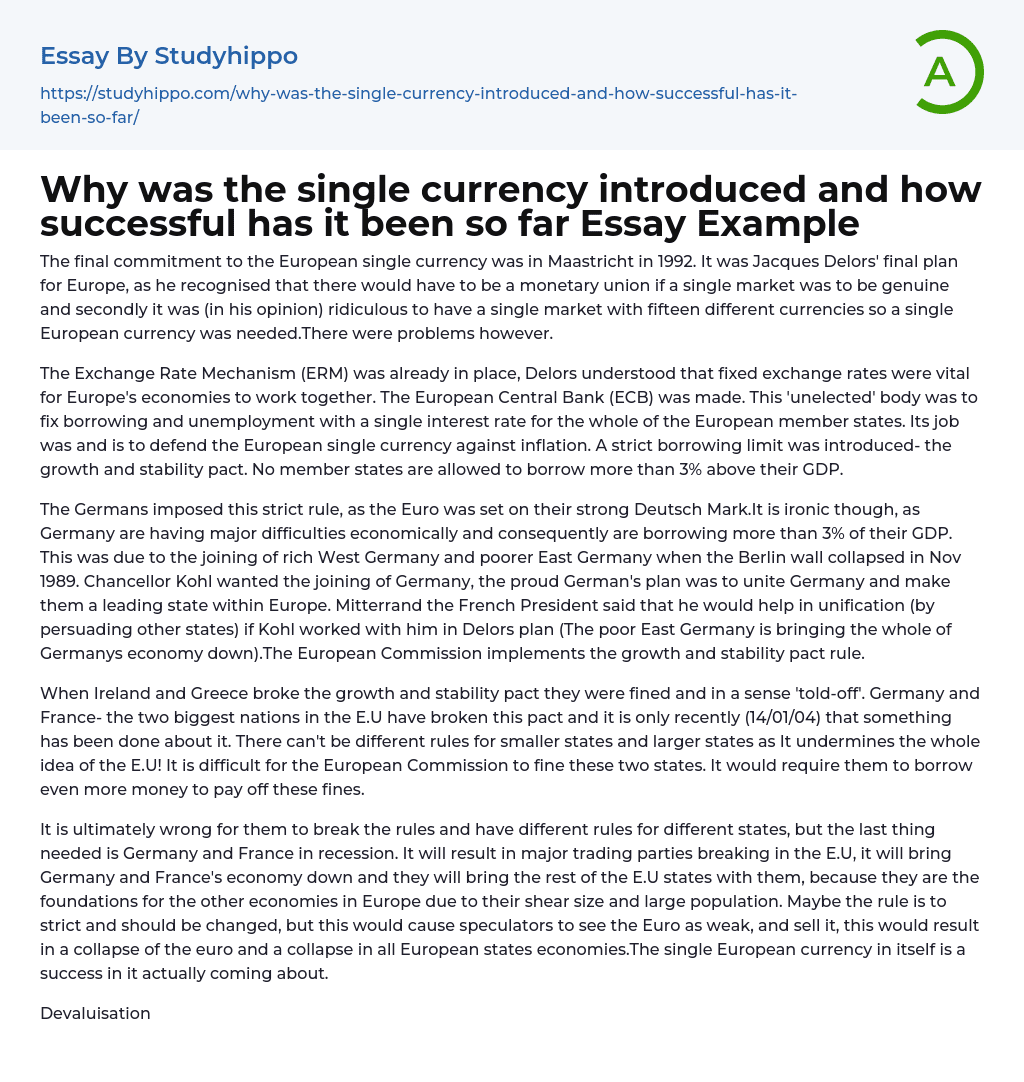

Why was the single currency introduced and how successful has it been so far Essay Example
The European single currency was ultimately agreed upon at the Maastricht meeting in 1992, which was considered Jacques Delors' last proposal for Europe. Delors believed that a monetary union was necessary for the establishment of a genuine single market and that it was unreasonable to have fifteen different currencies within it. Despite this, there were obstacles to overcome.
Delors acknowledged the significance of fixed exchange rates for European economies to collaborate. For this reason, the Exchange Rate Mechanism (ERM) was instituted and the formation of the European Central Bank (ECB), which maintains a uniform interest rate for all members while tackling borrowing and unemployment concerns. The ECB's duty is to safeguard Europe's common currency from inflation and enforce the growth and stability pact that imposes a rigorous borrowing ceiling of 3% above
...GDP on member nations.
The growth and stability pact rule is enforced by the European Commission, due to Germany's strict rule on the Euro, which was based on their strong Deutsch Mark. Ironically, Germany is currently facing major economic difficulties and borrowing over 3% of their GDP, largely caused by the unification of rich West Germany and poorer East Germany after the collapse of the Berlin Wall in November 1989. The proud plan of Chancellor Kohl was to unite Germany and make it a leading state within Europe, with French President Mitterrand offering to help in unification if Kohl supported Delors plan, as the poor economy of East Germany was dragging down the rest of Germany.
Both Ireland and Greece have been fined and reprimanded for violating the growth and stability pact. However, Germany and France - the two largest nations in the E.U
have only recently faced consequences for similar violations. This inconsistent treatment conflicts with E.U principles. The European Commission encounters difficulties when imposing fines on these bigger countries as they would need to borrow additional funds to pay them off.
While it is ethically wrong to breach regulations and apply varying rules in different states, it is crucial to avoid economic downturns in France and Germany as they play a significant role in the European Union. Failure of these nations could have a domino effect on other countries. Although modifying regulations may seem like a viable solution, doing so could make speculators perceive the Euro as weak leading to its demise and eventually causing the collapse of all European economies. Nevertheless, establishing a unified currency in Europe was a remarkable accomplishment.
Although devaluation does not occur between member states because the value of the Euro is universally understood, it is hindered by interest rates. In spite of this, it is practical since individuals in Greece, for instance, can visit Spain and comprehend the value of their currency without having to convert or do mental math. Nevertheless, adherence to the rules is crucial for its effectiveness, yet Germany and France have violated them.
In Ireland, high interest rates are maintained to curb consumption while Germany opts for low rates to stimulate spending. However, since a common currency is in use, it's impossible to have both high and low interest rates. The European Central Bank must prioritize the requirements of all European nations rather than just one. Despite being headquartered and operated by Germans, the ECB's judgments remain impartial and not influenced by Germany's economic challenges. Regrettably, the Euro has been
unsuccessful as member states relinquish authority over monetary affairs and political autonomy.
The pooling of sovereignty in Europe led to Britain's decision not to adopt the euro, primarily because of the Growth and Stability pact. The removal of Westminster's sovereignty and Thatcher's opposition to Delors also contributed. Black Wednesday in 1992 is a significant event when strict ERM rules were followed, but John Major decided against devaluing the pound, leading to a surge in interest rates. For more information on German language, see why German.
There are concerns about the potential consequences of joining the single European currency, such as increased expenses and higher unemployment rates. Some argue that the Growth and Stability pact, which is deemed too strict, could further exacerbate these issues. Currently, Chancellor Gordon Brown does not support the pact and believes that borrowing during a recession is acceptable, with the condition that it is repaid during an economic upturn within a certain timeframe. Adopting this approach in Europe would increase flexibility for the Euro and potentially expedite the UK's path towards joining the single European currency.
- Bank essays
- Banking essays
- Corporate Finance essays
- Credit Card essays
- Currency essays
- Debt essays
- Donation essays
- Enron Scandal essays
- Equity essays
- Financial Accounting essays
- Financial Crisis essays
- Financial News essays
- Financial Ratios essays
- Financial Services essays
- Forecasting essays
- Foreign Exchange Market essays
- Free Market essays
- Gold essays
- Investment essays
- Legacy essays
- Loan essays
- Market Segmentation essays
- Money essays
- Personal finance essays
- Purchasing essays
- Retirement essays
- Shareholder essays
- Stock Market essays
- Supply And Demand essays
- Venture Capital essays
- Absolutism essays
- Appeal essays
- Bourgeoisie essays
- Contras essays
- Corporate Governance essays
- Corruption essays
- Democracy essays
- Democratic Party essays
- Developed Country essays
- Dictatorship essays
- Elections essays
- European Union essays
- Federalism essays
- Foreign essays
- Foreign policy essays
- Gentrification essays
- Hillary Clinton essays
- Income Tax essays
- International Relations essays
- John Marshall essays



